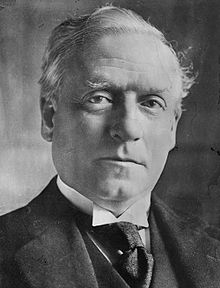Premiership of H. H. Asquith
|
The Right Honourable The Earl of Oxford and Asquith KG PC KC FRS |
|
|---|---|
 |
|
| Prime Minister of the United Kingdom | |
|
In office 5 April 1908 – 5 December 1916 |
|
| Monarch | |
| Preceded by | Sir Henry Campbell-Bannerman |
| Succeeded by | David Lloyd George |
| Chancellor of the Exchequer | |
|
In office 10 December 1905 – 12 April 1908 |
|
| Prime Minister | Sir Henry Campbell-Bannerman |
| Preceded by | Austen Chamberlain |
| Succeeded by | David Lloyd George |
| Home Secretary | |
|
In office 18 August 1892 – 25 June 1895 |
|
| Prime Minister | |
| Preceded by | Henry Matthews |
| Succeeded by | Matthew White Ridley |
| Secretary of State for War | |
|
In office 30 March 1914 – 5 August 1914 |
|
| Preceded by | J. E. B. Seely |
| Succeeded by | The Earl Kitchener |
| Leader of the Opposition | |
|
In office 12 February 1920 – 21 November 1922 |
|
| Monarch | George V |
| Prime Minister | |
| Preceded by | Donald Maclean |
| Succeeded by | Ramsay MacDonald |
|
In office 6 December 1916 – 14 December 1918 |
|
| Monarch | George V |
| Prime Minister | David Lloyd George |
| Preceded by | Sir Edward Carson |
| Succeeded by | Donald Maclean |
| Leader of the Liberal Party | |
|
In office 30 April 1908 – 14 October 1926 |
|
| Preceded by | Sir Henry Campbell-Bannerman |
| Succeeded by | David Lloyd George |
| Personal details | |
| Born |
Herbert Asquith 12 September 1852 Morley, West Riding of Yorkshire, England |
| Died | 15 February 1928 (aged 75) Sutton Courtenay, Oxfordshire, England |
| Resting place | All Saints' Church, Sutton Courtenay |
| Political party | Liberal |
| Spouse(s) |
|
| Children | 10, including Raymond, Herbert, Arthur, Violet, Cyril, Elizabeth, and Anthony |
| Education | |
| Profession | Barrister |
| Signature |  |
Herbert Henry Asquith, 1st Earl of Oxford and Asquith, KG, PC, KC, FRS (12 September 1852 – 15 February 1928), generally known as H. H. Asquith, served as the Liberal Prime Minister of the United Kingdom from 1908 to 1916, and was the last Liberal leader to lead that party in government without forming a coalition. He had a central role in the design and passage of major liberal legislation. In August 1914, Asquith took the United Kingdom into the First World War, but resigned amid political conflict in December 1916 and was succeeded by his War Secretary David Lloyd George.
Asquith's father owned a small business but died when Asquith was seven. Asquith was educated at City of London School and Balliol College, Oxford. He trained as a barrister and after a slow start to his career achieved great success. In 1886, he was adopted as Liberal candidate for East Fife, a seat he held for over thirty years. In 1892, he was appointed as Home Secretary in Gladstone's fourth ministry, remaining in the post until the Liberals lost the 1895 election. In the decade of opposition that followed, Asquith became a major figure in the party, and when the Liberals regained power under Sir Henry Campbell-Bannerman in 1905, Asquith was named as Chancellor of the Exchequer. In 1908, Asquith succeeded him as prime minister, with David Lloyd George as chancellor.
...
Wikipedia
